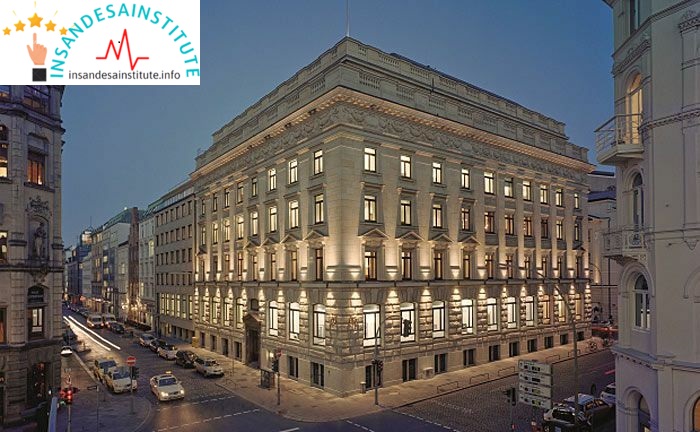Weathering the Storms of History: MM Warburg’s Enduring Fortress
The magnificent sandstone structure that houses MM Warburg’s headquarters stands as a testament to its resilience throughout the tumultuous twists of German history.
Despite enduring massive bombings during World War II, with one bomb hitting the roof but miraculously causing minimal damage, the bank prevailed. It weathered the storm of a devastating fire that swept through the neighborhood in a 1943 raid. The Jewish family that owned and operated the bank was forced into exile by the Nazis, only to return after the war and rebuild the institution into one of Germany’s most reputable private lenders.
However, a new crisis now envelops this legendary institution, resulting in the removal of its longtime chairman, Christian Olearius, and co-owner Max Warburg from the supervisory board. Warburg’s premises have been raided three times, including Olearius’ private residences. The chairman’s personal journals containing detailed records of his business life were among the seized documents.
Allegedly, Warburg was involved in controversial dividend trades known as Cum-Ex, which took advantage of double tax refunds. This scandal, estimated to have cost the state at least EUR10 billion in lost revenue, has rocked the financial sector, implicating banks from Deutsche Bank to Barclays.
The Investigation Unveils a Troubling Past
Olearius, his son Joachim, now the bank’s CEO, Max Warburg, and several high-ranking directors are currently under investigation for their involvement in Cum-Ex. Further charges are expected to be filed against Warburg employees by Cologne prosecutors.
Warburg’s Unlikely Role in Cum-Ex
The involvement of a discreet establishment like Warburg, known for cultivating an image of respectability, in what has been dubbed Germany’s largest tax heist has left investigators and the public perplexed.
While global giants like Bank of America’s Merrill Lynch and Barclays have made headlines for their participation in Cum-Ex, Warburg’s deep entanglement in the scandal remains surprising, considering its relatively modest size.
Warburg has long focused on private banking for the wealthy, as well as asset management and investment banking. The bank prides itself on its long-term approach and claims to conduct business based on a higher ethical standard, not solely for its own benefit.
A Historic Family-Owned Bank
Warburg is one of the few remaining family-owned private banks in Germany. Its roots can be traced back to Moses Marcus Warburg and Gerson Warburg, brothers who established a business in 1798. Over the next century, the bank expanded, becoming well-connected with governments worldwide.
The bank faced setbacks during World War II when the Nazis forced the family to give up their shares. It was later renamed Brinckmann, Wirtz & Co. However, after the war, the family reclaimed ownership and restored the bank’s original name.
The Cum-Ex Connection
Warburg’s first encounter with Cum-Ex occurred over a decade ago when a prominent tax lawyer pitched a new type of transaction to Olearius. These deals promised secure yet highly lucrative transactions centered around dividend tax, as stated in the charges filed by prosecutors in the Bonn case.
The bank’s involvement in Cum-Ex escalated from there. Warburg served as both a short-seller and a buyer in these transactions, continuing until 2011 when Germany changed its dividend tax collection method.
The bank has consistently maintained that it only engaged in legitimate dividend arbitrage transactions and was unaware of their connection to Cum-Ex. However, witnesses in the Bonn trial have disputed this claim, asserting that everyone involved was aware of and profited from Cum-Ex, even if the term itself was not explicitly used.
The Ongoing Legal Battle
The Bonn trial, which involves 34 cases, predominantly implicates Warburg and individuals associated with the bank. A verdict is expected in late March or early April. The court believes the deals to be criminal and has indicated that Warburg may have to pay approximately EUR280 million in lost tax revenue.
Facing mounting accusations, the bank initially adopted a defensive stance. However, public perception of Warburg and Olearius shifted, portraying them as profit-driven and willing to compromise their principles for financial gain.
In November, under mounting pressure, Olearius and Max Warburg stepped down from their positions due to their “social commitments,” as stated in their joint statement. This move appeared to be a planned generational handover. However, the regulator, Bafin, essentially forced out the long-standing duo that had guided the bank for decades.
A Change of Approach
Following their departure, the bank began demonstrating a more cooperative attitude. Less than three weeks after the announcement, attorneys informed the Bonn court that the bank was prepared to reimburse any profits generated from the implicated transactions, amounting to EUR68 million.
Additionally, the bank announced that Olearius and Max Warburg were ready to contribute the necessary funds to address the impact of Cum-Ex.
However, the road ahead remains uncertain for Warburg. As Professor Klaus Fleischer explains, “The entire issue is a significant risk for the bank. They can only avoid this with a settlement, but they’ll need a quick solution. However, it may already be too late.”

Note: The image above showcases MM Warburg’s headquarters, a historic sandstone fortress that has withstood the tests of time.



